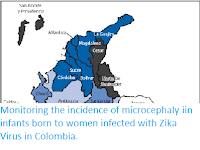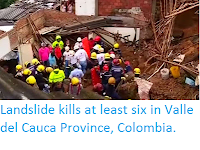Thirteen mineworkers have been confirmed dead following an underground explosion at an illegal coal mine near the town of Cucunubá in Ubaté Province, Colombia, on Friday 23 June 2017. The bodies of eleven of the men were confirmed dead shortly after the explosion, with the remaining two, who it was initially hopes might have survived, being found the next day
Rescue operations at an illegal coal mine at Cucunubá, Colombia, destroyed by an explosion on 23 June 2017. Jaime Saldarriaga/Reuters.
.
The explosion is thought to have been caused by a build-up of methane gas at the mine, which like many similar unregulated mines lacked the ventilation equipment to remove excess gas. Coal is formed when buried organic material, principally wood, in heated
and pressurised, forcing off hydrogen and oxygen (i.e. water) and
leaving more-or-less pure carbon. Methane is formed by the decay of
organic material within the coal. There is typically little pore-space
within coal, but the methane can be trapped in a liquid form under
pressure. Some countries have started to extract this gas as a fuel in
its own right. When this pressure is released suddenly, as by mining
activity, then the methane turns back to a gas, expanding rapidly
causing, an explosion. This is a bit like the pressure being released on
a carbonated drink; the term 'explosion' does not necessarily imply
fire in this context, although as methane is flammable this is quite
likely.
In addition, coal is comprised more or less of pure carbon, and therefore reacts
freely with oxygen (particularly when in dust form), to create carbon
dioxide and (more-deadly) carbon dioxide, while at the same time
depleting the supply of oxygen. This means that subterranean coal mines
need good ventilation systems, and that fatalities can occur if these
break down.
See also...
Follow Sciency Thoughts on Facebook.







